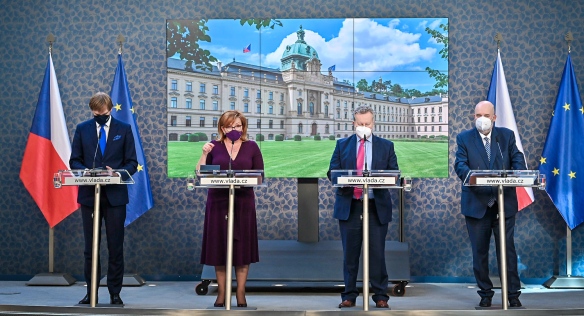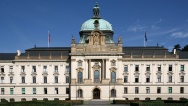Press Advisories
7. 6. 2021 20:59
Government worked on the 2022 state budget, approved the next steps in the dispute with Poland over mining in the Turów mine
The preliminary 2022 state budget of the Czech Republic assumes revenue at CZK 1 485.7 billion and expenditure at 1 875.7 billion, i.e. a deficit of CZK 390 billion. For the years 2023 and 2024, the Ministry of Finance envisages deficits at CZK 370 and 343 billion respectively. The budget proposal reinforces expenditure of the Ministry of Labour and Social Affairs by CZK 27.4 billion, mainly in connection with the proposed increase of pensions, foresees a higher expenditure on defence by 14.7 billion, or record investments in CZK 189 billion. The bill for the Budget Act, based on detailed budgets provided by the budget chapter managers, is to be submitted by the Deputy Prime Minister and Minister of Finance, Alena Schillerová, by 31 August. For more details see the press release of the Ministry of Finance (in Czech language).
The ministers were acquainted with the proposal of state budget expenditure on research, development and innovation in 2022, with a mid-term outlook for 2023 and 2024, and a long-term perspective until 2028. The expenditure on science and research in 2022 was proposed by the Government Council for Research, Development and Innovation at CZK 39.35 billion. For 2023, it should be 40.42 billion and for 2024 it should be 41.16 billion.
The government discussed a proposal of the next steps against Poland in the case of violating Union law by permitting the extension and expansion of mining in the lignite mine Turów. Based on a request of the Polish side, the Czech Republic agrees with concluding an international agreement at central government level. The agreement should guarantee fulfilment of the requirements of the Czech Republic on mitigating the negative effects of mining in the Turów mine on the Czech territory, and ensure financing by Poland of the necessary measures and payment of compensations for the existing as well as the expected costs incurred by the Czech Republic.
As the Union's judicial body has already decided on an interim measure ordering Poland to immediately suspend mining in the Turów mine until the final judgement is handed down in this case, and Poland has refused to respect that verdict, the government plenipotentiary representing the Czech Republic before the EU Court of Justice in cooperation with the Ministry of the Environment will submit to the EU Court of Justice a proposal to impose a penalty for each day of continued mining in conflict with the order of the EU Court of Justice on the preliminary measure.
The government also approved free provision of more protective equipment preventing the spread of the COVID disease to facilities caring for children who require immediate assistance. The facilities will receive from the State Reserve Bureau, among other things, 26 000 FFP2 respirators, 4 000 face masks or 150 protective face shields. These will be used both by the employees and the clients of the facilities. For more information see the press release of the Ministry of Labour and Social Affairs (in Czech language).
The cabinet gave consent to an increase in funding for the subsidy programme of the Ministry of Education, Youth and Sport (MEYS), used to finance summer educational camps focused on reducing the negative impacts of the COVID-19 pandemic on children aged 6 to 15. The issued call received so many applications from non-governmental non-profit organisations, higher education institutions and educational establishments that the demand from applicants meeting the formal criteria of the grant exceeded the original allocation of CZK 100 million by CZK 159.83 million. Today, the government agreed to increase the allocation from unused expenditure funds and savings of MEYS so that all the projects, aiming to compensate children and students for the missed months of normal school attendance including social engagement, can be implemented.
The government discussed three applications for investment incentives. The applications from the company ALFA CHROM Servis wanting to invest CZK 73 million in expanding the production of press moulds and their accessories in Bruntál, the company RECUTEH intending to expand its production of counterflow exchangers for CZK 148.06 million, and the company Meopta-Optika planning to spend CZK 970.6 million on expanding the production of detecting and displaying optical modules in Přerov were granted by the cabinet who will provide them with income tax credit.
The government also discussed several changes in the extraordinary epidemic-control measures of the Ministry of Health. With effect from 8 June, the conditions for entry into establishments providing services and into sports or cultural institutions will be levelled out, among other things. Their visitors will be allowed to produce all possible forms of proof of being COVID-19 negative, including a self-test carried out directly on the spot. The number of permitted spectators can also be increased in cultural and sports events, i.e. 50 percent of the seating capacity can be filled, with maximum 1,000 people inside or 2,000 outside, and if the outdoor space has a capacity higher than 2,000 places, the organisers may fill up to 25 percent of the total number of seats.
The rules for wearing breathing protection are eased in all regions except for the South Bohemian, Liberec and Zlín Regions. From 8 June, pupils, students and teachers no longer have to use protective devices while seated during lessons or lectures. The same exception applies to employees at their workplace, if they are exclusively in the presence of their co-worker. The exception from the use of breathing protection during tests will apply in the whole country under the condition that the tested and the testing person keep a two-metre distance from the other persons.
From Tuesday, the conditions are modified for visits to health facilities and social care facilities: the validity of PCR tests is extended to seven days, and that of POC antigen tests to 72 hours, and tests performed by employers or schools will be recognised too. Vaccinated persons will show their certificates and it will be possible to undergo a test on the spot. The list of countries with which bilateral agreements are concluded on recognising vaccination or test certificates will be extended to include the Republic of Serbia from 8 June.
With effect from 11 June, the Ministry of Health modifies the time periods between the first and second dose of vaccines. For the COMIRNATY vaccine from Pfizer/BioNTech, the second dose can be applied after 38 to 42 days, for the VAXZEVRIA vaccine from AstraZeneca after 84 to 91 days, and for the MODERNA vaccine after 25 to 35 days following the first dose. The government approved cancelling the mandatory testing for all types of employers from 1 July.
Useful information
- Hotline
Ministry of Transport
+420 225 131 820
Ministry of Industry nad Trade
+420 224 854 444
Ministry of Foreign Affairs
+420 224 183 200
Ministry of Interior (borders, security)
+420 739 608 533
Ministry of Education, Youth and Sports
+420 778 725 602
- Current information on Covid-19 caused by the Chinese coronavirus on the website of the Ministry of Health – information for citizens and healthcare workers, current data.
- Entry into the territory of the Czech Republic
- The European coronavirus response team







